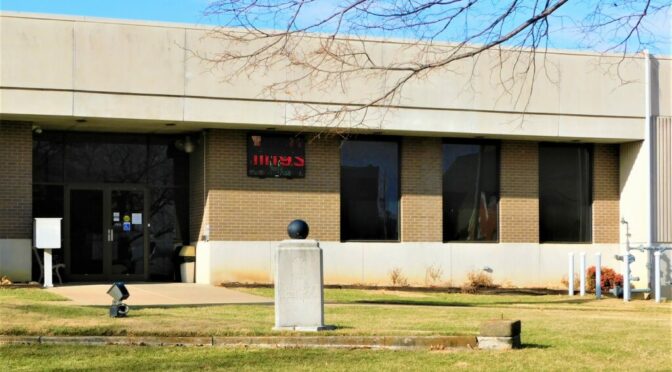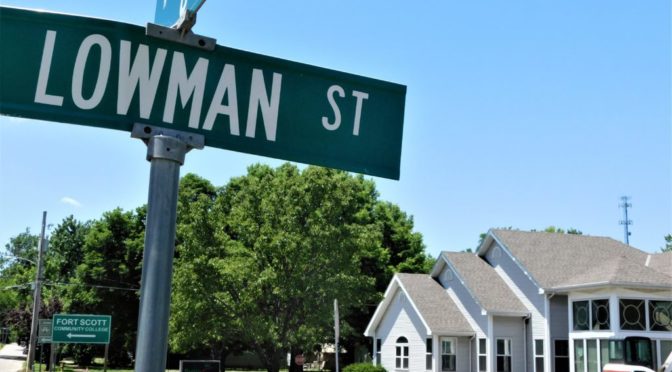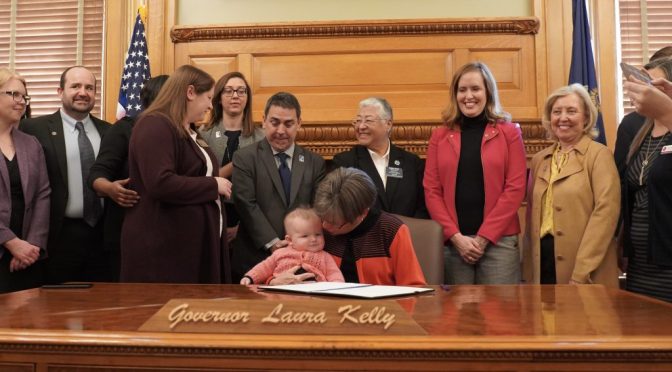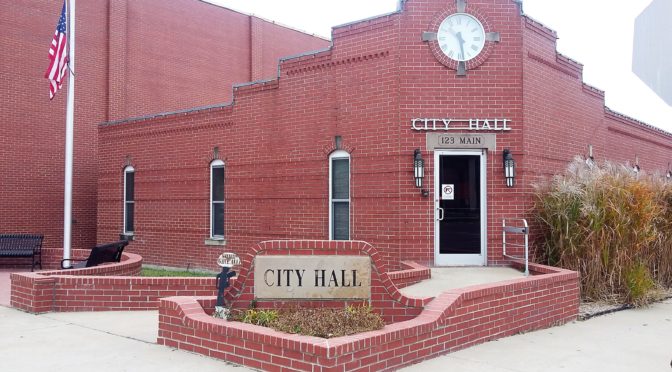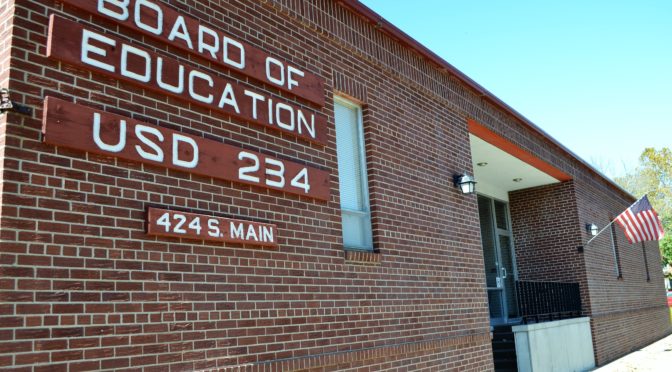Category Archives: Government
2023 Eastern Kansas Weed School Comes to Bronson on Jan. 24
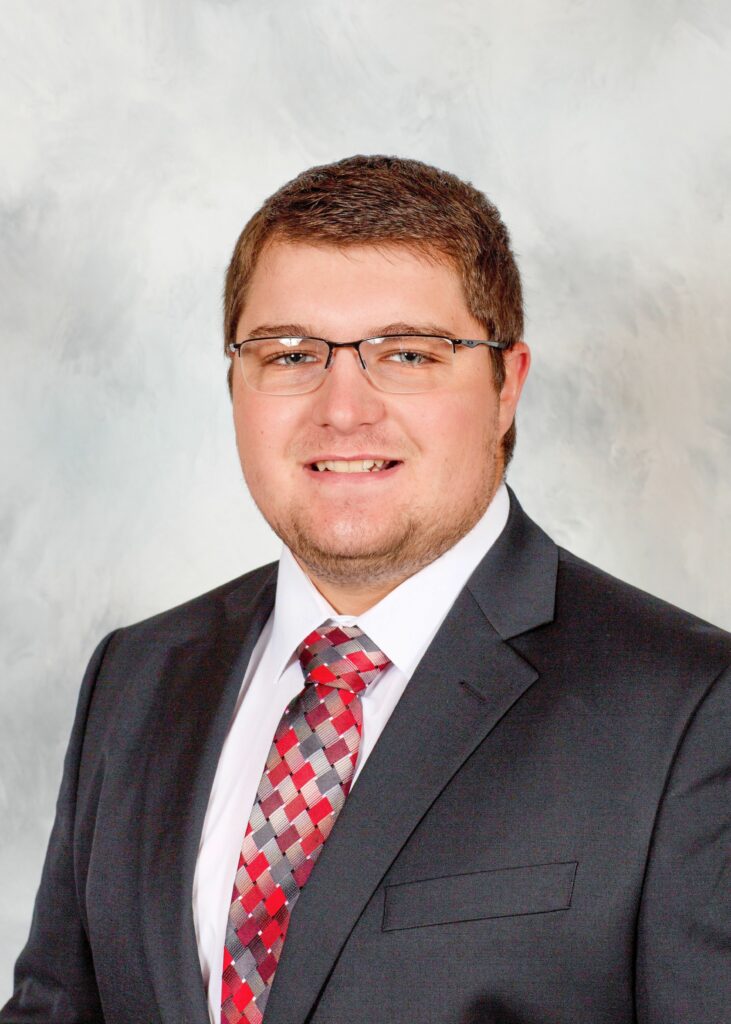
District Extension Agent, Crop production and Forage Management
Southwind District
210 S. National
Fort Scott, Kansas 66701
Office: 620-223-3720
Cell: 308-991-8415
[email protected]
Kansas State Research and Extension will be hosting the 2023 Eastern Kansas Weed Schools in three locations across eastern Kansas:
January 23rd, Ottawa, Neosho County Community College, 7-9 pm
January 24th, Bronson, Bronson Public Library, 7-9 am
January 24th, Parsons, SE Research and Extension Center, 11:30 am- 1:30 pm
Please join us and come with any of your herbicide related questions in either crops or pastures!
Dr. Sarah Lancaster will discuss row crop weed management with her presentation, “Timely Tips for Corn and Soybean Weed Management.” Dr. Bruno Pedreira will discuss his work on broomsedge and pasture weed control with his presentation, “Successful Control of Broomsedge and Pasture Weeds.”
To register please contact your local extension office. Ottawa – Frontier District, 785-229-3520, [email protected]; Bronson – Southwind District, 620-365-2242, [email protected]; Parsons – Wildcat District, 620-784-5337, [email protected].
This program is free thanks to our sponsor, Frontier Farm Credit.
Bourbon County Commission Agenda for Jan. 17
Agenda
Bourbon County Commission Room
1st Floor, County Courthouse
210 S. National Avenue
Fort Scott, KS 66701
Date: January 17, 2023
1st District–Nelson Blythe Minutes: Approved: _______________
2nd District–Jim Harris Corrected: _______________________
3rd District–Clifton Beth Adjourned at: _______________
County Clerk–Ashley Shelton
MEETING HELD IN THE COMMISSION ROOM BEGINNING AT 9:00AM
Call to Order
• Flag Salute
• Approval of Minutes
• Signatures for Accounts Payable & Payroll
• Eric Bailey – Road & Bridge Report
• Matt Quick – NRP Program
• Lora Holdridge – Survey Review Discussion
• Jim Harris – Organizational Changes
• Nelson Blythe – Move meeting from Feb 21st to Feb 24th
• Susan Bancroft – Chief Financial Officer
o Broker Selection
o Food Sales Tax Reduction
• Shane Walker – Chief Information Officer
• Justin Meeks – County Counselor
• Public Comment
• Commission Comment
Justifications for Executive Session:
KSA 75–4319(b)(1) To discuss personnel matters of individual nonelected personnel to protect their privacy
KSA 75–4319(b)(2) For consultation with an attorney for the public body or agency which would be deemed privileged in the attorney–client relationship
KSA 75–4319(b)(3) To discuss matters relating to employer–employee negotiations whether or not in consultation with the representative(s) of the body or agency
KSA 75–4319(b)(4) To discuss data relating to financial affairs or trade secrets of corporations, partnerships, trust, and individual proprietorships
KSA 75–4319(b)(6) For the preliminary discussion of the acquisition of real property
KSA 75–4319(b)(12) To discuss matters relating to security measures, if the discussion of such matters at an open meeting would jeopardize such security measures.
Attachment:
Avian Influenza “Bird Flu” in Kansas

Note from the Local Health Officer Rebecca Johnson BSN, RN
SEK Multi-County Health Department
524 S. Lowman, Ft. Scott, KS 66701
P(620)223-4464 F(620)223-1686
Avian Influenza “Bird Flu”
1/13/2023
As egg prices are skyrocketing and it may be costing you more to eat out, you may be asking yourself why all of this is happening, if you haven’t turned on the news much lately. Well, Avian Influenza is much of the cause, or otherwise known as the “bird flu”. Highly pathogenic avian influenza (HPAI) has continued to be detected in new locations nationwide, including new counties in Kansas.
This viral disease appears to be spread by the migration of wild birds which puts Kansas’ domestic birds at risk. HPAI causes severe disease and high mortality in infected poultry and is a concern for the possibility of being transmitted to humans who are exposed.
Infected birds shed the bird flu virus through their saliva, mucous and feces. Though rare, human infections with bird flu viruses can happen when “enough” virus gets into a person’s eyes, nose, mouth, or is inhaled. Transmission can happen through air (droplets, dust) and in inhaled, or when a person touches something that has the virus on it then touches their mouth, eyes, or nose. Most human infections with bird flu have occurred after unprotected contact with infected birds or surfaces contaminated with bird flu viruses.
I am probably getting an eyeroll right now from any hunters that might be reading this, but the CDC recommends whenever possible, avoiding contact with wild birds because they may not appear to be sick. You should avoid unprotected contact with domestic birds (poultry) that are sick or who’ve died. Do not touch surfaces contaminated with saliva, mucous or feces from wild/domestic birds. If you do or you must encounter birds (such as occupational exposure, hunters, bird owners, hobby flocks) take these precautions to prevent infection:
- Wear protective equipment such as gloves, respirators, -or well-fitting masks, and eye protection.
- Avoid touching your face!
- Wash your hands with soap and water after touching birds and surfaces birds inhabit or frequent.
I recommend the seasonal flu shot as well, though it will not prevent infection with bird flu viruses, it can help reduce the risk of getting sick with human and bird flu viruses at the same time. It’s not too late to get a flu shot. We have them available at any of our 4 offices. Allen County: (620)365-2191, Anderson County: (785)448-6559, Bourbon County: (620)223-4464, or Woodson County: (620)625-2484.
See these helpful links for more information:
https://www.cdc.gov/flu/avianflu/index.htm
Thank you,
Rebecca Johnson BSN, RN
SEKMCHD Administrator/SEK Local Health Officer
Reference: Centers for Disease Control, Kansas Department of Agriculture
Governor Kelly Announces Fiscal Year 2024 Budget
~~Budget Is Balanced, Responsibly Cuts Taxes, Fully Funds Schools~~
TOPEKA – Governor Laura Kelly today announced her annual budget, outlining her common-sense, fiscally responsible plan to provide tax relief for Kansans, fully fund schools for the fifth year in a row, and make one-time investments that will pay off debts and expand healthcare.
“My budget reflects my plan to responsibly cut taxes, continue growing our economy, fully fund education, and strengthen our infrastructure and workforce,” Governor Laura Kelly said. “We’re building a better Kansas for working families and retirees — all while maintaining a balanced budget.”
The budget:
- Provides responsible tax relief: Governor Kelly’s “Axing Your Taxes” plan will save Kansans more than $500 million in tax cuts over the next three years. The plan includes a proposal to completely axe the state sales tax on groceries, diapers, and feminine hygiene products by April 1, 2023. The second proposal adds a four-day back-to-school sales tax holiday, and the third increases the exemption on Social Security income tax to provide tax relief for retirees.
“Let’s pass tax cuts that we can afford and help working families and seniors – while allowing us to continue the progress we’ve made on education,” said Governor Kelly.
- Fully funds schools for the fifth year in a row: The Governor’s budget fully funds K-12 schools for the fifth consecutive year and puts Kansas on the path to fully fund special education. The budget also invests nearly $110 million in higher education, allowing schools to continue the recent trend of low-to-no tuition increases and expand financial aid.
“The special education funding gap impacts every student because schools end up diverting funds away from other areas to provide these services,” said Governor Kelly. “I fully recognize that Congress hasn’t done its part to deliver the federal funding it promised for special education services, and I’ll continue to work with our congressional delegation to push the federal government to hold up it is end of the bargain. But in the meantime, Kansas families need solutions.”
- Prepares Kansas for the future: The Governor’s budget adds $500 million to the Rainy Day Fund, putting the balance at $1.5 billion. When Governor Kelly first came into office, the Rainy Day Fund was empty. Now Kansas is in a much better position to weather future storms.
- Invests in stronger infrastructure: The Governor’s Budget keeps the ‘Bank of KDOT’ closed for the second year in a row and adds $220 million to the state’s “Infrastructure Leveraging Fund” so that local communities can have the state and local matching funds they need to access federal funding for transportation, broadband, and water infrastructure upgrades.
- Saves taxpayers money by paying off debt: By paying off the remaining $53 million for reservoir debts at Milford and Perry Lakes, Governor Kelly’s budget will save taxpayers nearly $30 million in future interest payments. The budget also pays in cash for the state’s share of the proposed new veterans home in Topeka – saving close to $10 million in interest.
- Invests in Kansas workers: The Governor’s budget ramps up funding for the recently formed Office of Registered Apprenticeship and invests in a college internship program to encourage the next generation of Kansans to stay in the state post-graduation.
“As Kansas aims to continue shattering economic records, there’s one thing in our way: There aren’t enough skilled workers for all the jobs we’re creating. Our labor shortages are driving up prices and stunting our economic growth,” said Governor Kelly. “These investments will help create a strong pipeline of talent that has abundant educational and economic opportunities right here at home.”
- Continues to repair Kansas’ foster care system: The Governor’s budget invests over $5 million to increase placement rates for foster homes and support foster kids transitioning to adulthood.
- Expands mental and physical healthcare and saves Kansas hospitals: The Governor’s budget directs over $12 million to the current KanCare program to eliminate disparities in service for KanCare program recipients, enhances the ability to secure providers, and expands network capacity. The budget also shows why Kansas must expand Medicaid. Kansas will receive an estimated $370-$450 million in additional federal funding over the next two years when we expand Medicaid – which would cover the state’s share of expansion for eight years.
“By far, the most impactful thing we could do to improve Kansans’ health, keep our healthcare workers, and save rural hospitals is expand Medicaid and draw down billions of dollars – our own tax dollars – waiting for us in Washington, D.C.,” said Governor Kelly.
- Increases state employee pay by 5%: The Governor’s budget works to recruit and retain state workers by increasing pay and maintaining the Career Progression Plan for Kansas Highway Patrol officers that was provided in last year’s budget.
- Makes investments in housing and childcare: The Governor’s budget invests in early childhood education and care, giving local communities the ability to implement solutions tailored to their needs. It also provides $20 million to the Housing Revolving Loan Program to help expand housing stock across the state, especially in rural Kansas.
- Invests in IT infrastructure and cybersecurity: The Governor’s budget works to modernize and protect IT systems across state government and provide additional IT support and cybersecurity measures at state agencies.
View the Governor’s full budget recommendations here.
Governor Establishes Early Childhood Transition Task Force
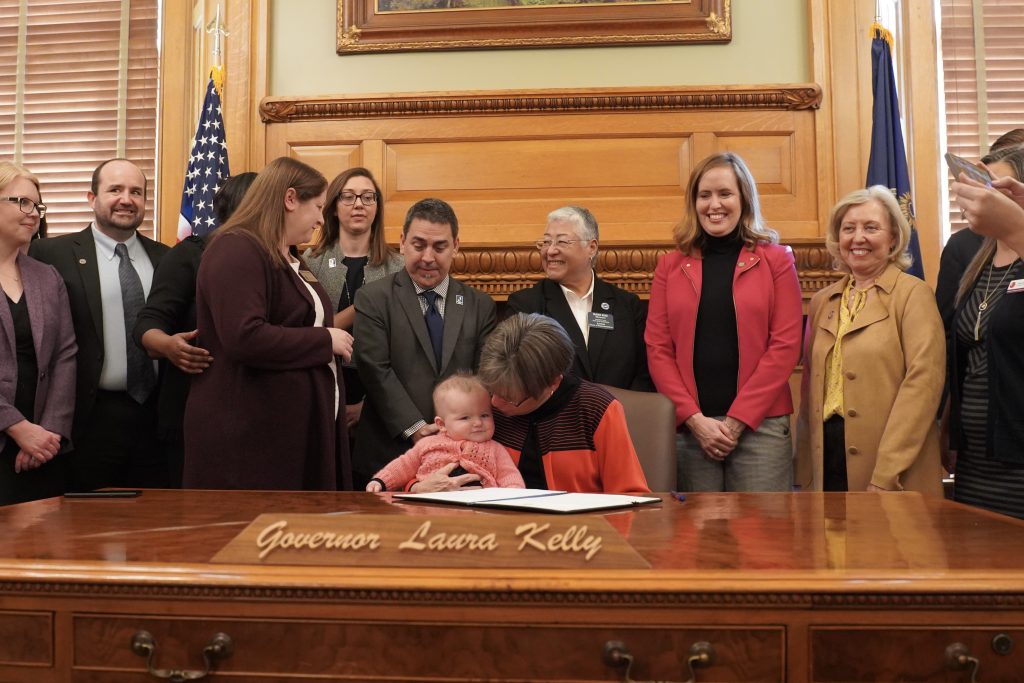 Governor Kelly Signs First Executive Order of Second Term to Improve Early
Governor Kelly Signs First Executive Order of Second Term to Improve Early
Childhood Development
~~Establishes Task Force to Develop a Plan for a New Early Childhood-Focused State Agency~~
TOPEKA – Governor Laura Kelly today signed the first executive order of her second term, Executive Order 23-01, to establish the Early Childhood Transition Task Force. The Task Force is charged with reviewing Kansas’ early childhood programs and developing a roadmap for the creation of a new state, cabinet-level agency focused solely on supporting the success of our youngest Kansans.
“Yesterday, I laid out a vision for my next four years, to make Kansas the best place in America to raise a family. Today we are taking a significant step forward in pursuit of that goal,” Governor Kelly said. “Giving Kansas kids the strongest start to life is the best possible investment we can make. This task force will determine how to make that investment most effectively.”
The task force will analyze the current early childhood system and how it is financed – focusing on gaps, inefficiencies, and redundancies. It will also conduct a series of stakeholder engagement opportunities and draft a transition plan for the new agency.
The task force will build on the Kelly Administration’s first term efforts around early childhood, which include investing more than $270 million to support child care providers and increasing access to reliable, affordable child care.
The task force will include representatives from state government, the private sector, philanthropic organizations, early childhood service providers, and advocacy organizations. Governor Kelly will also invite members of the Kansas Senate and the Kansas House of Representatives to be members of the task force.
The complete text of Executive Order #23-01 can be found here.
What they’re saying:
“Early childhood care and education is the cornerstone for a child’s well-being,” Secretary of the Department for Children and Families Laura Howard said. “I am excited to embark on this journey of collaboration, under the steady leadership of Governor Kelly, as we work to move early childhood policy forward to address the needs of Kansas families.”
“I applaud the Governor for having the vision to create this task force,” Secretary of the Kansas Department of Health and Environment Janet Stanek said. “I look forward to collaborating with policy experts and others to align on early childhood policy development within a future agency that will bring greater efficiencies and eliminate structural barriers for families, communities, and businesses.”
“The work of this new task force represents a commitment to the transformational change needed to create an early childhood care and education system that works for all Kansas families,” Melissa Rooker, executive director of the Kansas Children’s Cabinet and Trust Fund, said. “The pandemic revealed the challenges in our current system, and we are excited to go to work developing an action plan to address barriers, gaps, and opportunities to serve our youngest Kansans more effectively.”
“Governor Kelly is a champion for Kansas children who understands that high-quality early learning opportunities and family support programs are among the best investments we can make as a state,” John Wilson, President of Kansas Action for Children, said. “The best policies and proposals are those that have been shaped by diverse stakeholders, which is why I am excited for the work of this task force. It will build upon the strong, collaborative work that’s been happening across state agencies to improve the health and well-being of children and families.”
The FS Landmark Meeting is Jan. 16 at 4 p.m.
The Landbank will meet on Monday, January 16th, 2023, at 4:00 p.m. at City Hall, 123 S. Main Street, Fort Scott, Kansas.
This meeting is open to the public. This meeting will be made available via the City’s YouTube channel at City of Fort Scott.
The Bourbon County Commission Minutes Dec. 13, Jan. 3, Jan. 4
FS Parks Advisory Board Meets Jan. 12 at 4 p.m.
The Parks Advisory Board will meet on Thursday, January 12th, 2023, at 4:00 p.m. at City Hall, 123 S. Main Street, Fort Scott, Kansas.
This meeting is open to the public. This meeting will be made available via the City’s YouTube channel at City of Fort Scott.
U234 Board of Education News Release
BOARD OF EDUCATION REGULAR MEETING
NEWS RELEASE
Monday, January 9, 2023
Members of the USD 234 Board of Education met at 5:30 p.m. on Monday, January 9, 2023, for their regular monthly meeting at the board office.
President Danny Brown opened the meeting.
The board approved the official agenda, and the consent agenda as follows:
- Minutes from December 12, 2022, Board of Education meeting
- Financials – Cash Flow Report
- Check Register
- Payroll – December 16, 2022 – $1,571,721.90
- Activity Fund accounts
- Second Semester Enrollment Count Report
- Board Policy Additions/Changes
- Resolution 22-10 – To Establish Election of School Board Officers
- Resolution 22-11 – To Establish Regular Meeting Dates
Shelly Charter, Winfield Scott Elementary principal, introduced two students from Winfield Scott. The first student recognized was Sadie Keylon who demonstrates mindfulness by being polite and helpful to friends. The second student was Megan Hunsaker who demonstrates mindfulness by being humble and leadership through leading by example. Megan was selected by Peerless Products to have a paint chip named after her.
Licensed Tiger Team Member – Superintendent Destry Brown recognized Allison Gorman as the Licensed Tiger Team Member of the Month.
- Miss Gorman is a 7th grade math teacher at Fort Scott Middle School. She displays on a daily basis the excellence of teaching in our classrooms. She encourages students, teaches from the beginning of class to the end, and her students know they can be successful in her class. Miss Gorman has been with the district for 12 years.
Classified Tiger Team Members – Superintendent Destry Brown recognized Shawn O’Brien and Alisha Watkins as the Classified Tiger Team Members of the Month.
- O’Brien is the payroll clerk for the district along with other payroll duties, helps employees upon hire, and schedules orientations. He also is active in the community with volunteering, as well as supporting our kids at school events. Mr. O’Brien has been with the district 3 years.
- Watkins is a custodian at both the board office and the middle school, and also fills in around the district when help is needed. She is always willing to do what can to help, fixes things without having to be asked, and responds in a positive manner. Mrs. Watkins has been with the district for 3 years.
Superintendent Brown reported to the board that 98 students were enrolled in 166 courses with Fort Scott Community College for dual credit while attending high school. Mr. Brown presented a preliminary 2023-24 calendar for the board to review based upon the feedback he received from parents and staff.
Dalaina Smith, Assistant Superintendent, provided an update to the board on professional development, PLC conversations, and results of those conversations. For example, the anticipation is that by this summer, the district will have standards published by grade level that would show parents what their students(s) should learn each school year. Mrs. Smith also provided an update on resource adoptions, resources needed in reading, and assessments.
Gina Shelton, Finance Director, updated the board on the ESSER III application, the state audit, and salary schedule column advancement.
The board received an update from Superintendent Brown on the expansion of the Fort Scott Preschool Center to Woodland Hills Blvd. Mr. Brown presentation included information on why preschool should be expanded in the USD 234 school district and what that expansion would look like. There was discussion of funding, contracts, and alternative options. There was no action taken.
The board approved the following items:
- Communications Investment Proposal with Trajectory Strategies, in the amount of $15,660
- FSHS Course Additions for the 2023-24 school year
- Revised Classified Pay Schedule to amend the Activity Driver Pay
- Personnel Report – following
The board tabled a proposal for architectural and engineering design services for the preschool from h|d Architecture, LLC until more information was received. There was also discussion on a school district attorney.
The board went into an executive session for personnel matters.
President Danny Brown adjourned the meeting.
PERSONNEL REPORT – APPROVED EMPLOYMENT
RESIGNATIONS/TERMINATIONS/RETIREMENTS:
- Michelle Martin – Retirement – FSHS Special Education teacher, effective at the end of the 2022-23 school year
- Carol Bingesser – Retirement – FSMS Science teacher, effective at the end of the 2022-23 school year
- Kelly Cox – Retirement – Winfield Scott Kindergarten teacher, effective at the end of the 2022-23 school year
- Cristin Stark – Resignation – Winfield Scott Kindergarten teacher, effective at the end of the 2022-23 school year
- Trent Johnson – Resignation – FSHS Agriculture teacher and FFA sponsor, effective December 19, 2022
- Mark Gorman – Leave of Absence – Bus Driver
- Connie Billionis – Leave of Absence – Deputy Clerk
- Sarah Hendricks – Leave of Absence – Eugene Ware fourth grade teacher
EMPLOYMENT/REASSIGNMENTS – FOR THE 2022-23 SCHOOL YEAR
- Tonya Barnes – Special Education Director for the 2023-24, 2024-25, and 2025-26 school years
- Kyle Parks – Daily rate for the remainder of the semester as a FSHS Agriculture teacher and FFA sponsor
- Judy Welch – Regular Route Bus Driver (4-hours)
- Chelsea Killion – Winfield Scott 7.5-hour paraprofessional
- Jana Walker – Winfield Scott 7.5-hour paraprofessional
- Julius Hodges – Winfield Scott 7.5-hour paraprofessional
- Destry Brown – Superintendent – Contract extension
Amended Agenda For FS City Commission Meeting for Jan. 10
NOTICE OF AND AGENDA FOR MEETING
OF FORT SCOTT CITY COMMISSION
CITY HALL COMMISSION MEETING ROOM
123 SOUTH MAIN STREET
JANUARY 10, 2023
6:00 P.M.
I. Roll Call:
J. Jones T. Van Hoecke M. Wells E. Woellhof K. Harrington
II. Flag Salute:
III. Invocation: Led by: M. Wells
IV. Approval of Agenda: Amended from original release on 1/6/2023
V. Consent Agenda:
A. Approval of minutes of the regular meeting of December 20 th, 2022.
B. Approval of Appropriation Ordinance 1327-A totaling $519,425.14
C. Request to Pay – BakerTilly – $9,775.78 – Jeff Hancock Services and
Expenses for November 2022, Expenses for October 2022.
D. Request to Pay – BakerTilly – $5,104.04 – Interim Financial Management for November 2022.
E. Request to Pay – EPEC – $459,666.73
1. Cell 1 Aeration Upgrade – $424,088.60 – 65% of Total
2. Baffle Curtain – $35,578.13 – Installation has been completed
F. Request to Pay – Foley Equipment – $180,000.00 – Caterpillar 936K Track Loader Model 963K.
G. Approval of CMB License For Consumption on the Premises – Debra Cagle DBA Fifthwheel Tavern – 206 N. Humbolt
H. Resolution No. 1-2023 – DESIGNATING THE OFFICIAL CITY NEWSPAPER FOR THE ENSUING TERM OF THE GOVERNING BODY OF THE CITY OF FORT SCOTT, KANSAS.
I. Resolution No. 2-2023 – DESIGNATING THE OFFICIAL DEPOSITORIES FOR THE PUBLIC FUNDS OF THE CITY OF FORT SCOTT, KANSAS –
(Possibly hold)
J. Resolution No. 3-2023 – EXEMPTION FROM GENERALLY ACCEPTED
ACCOUNTING PRINCIPLES UNDER K.S.A. 1120
VI. Reorganization of City Commission
• Election of Mayor
• Commission President
• Bourbon County REDI Representative
• Land Bank Representative
• Fort Scott Housing Authority Delegate
• Lake Advisory Board
• Library Board (Mayor)
VII. Public Comment:
(Sign up required. Comments on any topic not on agenda and limited to five (5) minutes per person, at Commission discretion)
VIII. Old Business:
A. December financials by Ben Hart
B. Update of progress with Code compliance at 102 S. Horton
C. Lake Dock Locations – Doug Guns
IX. Appearances:
A. Renodry USA – Michael Clancy will address the Commission
regarding their services
X. Public Hearing: None
XI. New Business:
A. Approval of Bid for Demolition of 523 S. Heylman, Bid #48-2022 – Dave’s Demolition at $1,800.00 or Skitch’s Hauling and Excavation at $3,425.00
B. Approval of 2023 Holiday Schedule
C. Consideration of Jeff Hancock’s Amended Contract – BakerTilly
D. Permission to go out for picnic table grant – Dave Bruner
E. Consideration of Brick Street Policy – M. Wells
F. Consideration to Go Out for Banking Bids – J. Jones
XII. Reports and Comments:
A. Interim City Manager Comments:
B. Engineering Comments:
C. Commissioners Comments:
J. Jones – National Street School Sign
T. VanHoecke –
M. Wells –
E. Woellhof –
K. Harrington –
D. City Attorney Comments:
XIII. Executive Session – If requested, (please follow script in all motions for
Executive Sessions)
XIV. Adjournment:
U.S. Senator Jerry Moran Newsletter
Swearing-In Ceremony
This week, I was joined by my family as I was sworn in to serve Kansans for a third term in the United States Senate. Representing Kansas in the U.S. Senate is one of the greatest privileges of my life and a solemn responsibility I do not take lightly.

As the 118th Congress begins, I took the time to reflect on those who have served before me and on the significance of the duty Kansans have placed with me. I am humbled by this responsibility and look forward to continuing to advocate for Kansas values in Washington, D.C.
2022 in Review
Throughout the past year, I visited with thousands of Kansans across the state. I am grateful to each of you for these conversations and for the insight you offer into the many issues we are facing as a country.
I am also reminded of one of the most important tasks for my office: helping Kansans navigate and resolve issues with federal agencies through casework. Please do not hesitate to reach out to my office if we can be of any assistance regarding Social Security, Medicare or veterans’ affairs, or if you have other concerns regarding federal issues. You can learn more about how to do this here.

